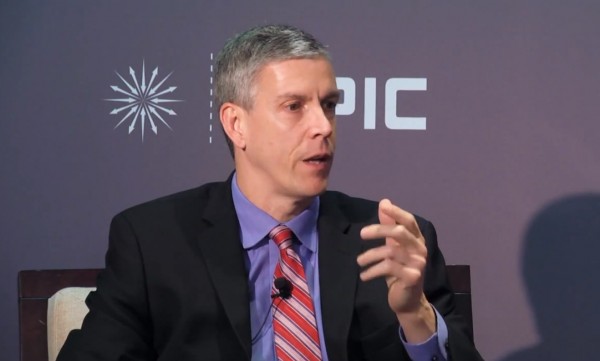Feds Emphasize 7-to-1 Investment Return for Early Childhood Education

The Public Policy Institute of California (PPIC) flipped the California-focused script and spoke with Education Secretary Arne Duncan about the developments of the federal role in schools. The conversation was heavy on details, but Duncan placed early childhood education as the federal priority.
Mark Baldassare, President of PPIC, asked Duncan why the federal government is in the process of investing a total of $75 billion into early childhood education, and how this is possible. Duncan responded:
"Less than 3 in 10 four-year olds today have access to high quality pre-kindergarten. The average child from a disadvantaged community starts kindergarten at the age of five at a year to a year-and-a-half behind. Then we wonder why we have achievement gaps, we wonder why we have dropout rates. We have to get out of the catch-up business."
The US Education Department has it's priorities set. So, how does it go about solving the problems that Duncan mentioned? He elaborated on partnering with the Department of Health and Human Services to provide a continuous educational flow from ages zero to five.
The DHHS would focus on zero to three development, done through more home visiting and Early Head Start. However, the Head Start program has experienced less than stellar funding.
"The goal is to add at least another one million kids to high quality pre-kindergarten. It's not cheap. We've proposed a cigarette tax, 94 cents per pack. Some folks love that, some folks don't...If someone has a better idea of how to pay for it, I'm more than open to it."
Duncan says 233,000 less teenagers will begin smoking because of price-consciousness, the added health benefit of placing a cigarette tax.
To drive the conversation home, Duncan cites Nobel Prize winner James Heckman who concludes a 7-to-1 return on investment for early childhood education. The result is not only rooted in producing individuals who will pay more in taxes. There is said to be cost reductions for the government with less teen pregnancy, dropouts, and crime.
Duncan explains that he's been able to rally partners from different groups to consider investing in early education. He says military leaders, faith-based groups, businesses and CEOs have been responsive to the cause. A few politicians are also among the responsive:
"[Early education] has become a bipartisan issue. We have Democrat and Republican governors who all, in tough economic times, who are willing to invest and put scarce money behind this. Question is, can we get a dysfunctional Washington to pay attention to the real leadership around the country?"
A clear timetable is missing from the conversation because of the nature of early childhood education, and Duncan acknowledges that. He also states there will be no top-down type of reforms taking place. It's a matter of investment and providing the resources for states to carry out necessary early education programs.
The ages between zero and five are the formative years in human development. Studies show that 85 percent of the human brain is physically developed before the age of five.
The discussion of early childhood education takes place between the 12 to 20 minute mark in the PPIC Speaker Series video. It can be viewed here:
http://www.youtube.com/watch?v=OlAXNdQ_CGo&feature=share&list=PLE43F1E7301CAC1B4




